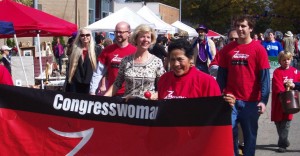U.S. Senate Candidate Tammy Baldwin Delivers Passionate Defense Of Progressivism
December 14, 2011
 By Amanda Terkel for Huffington Post — The typical Washington consultant has simple advice for Senate candidates in a purple state: Run to the middle, and whatever you do, don’t let your opponent smear you as a liberal.
By Amanda Terkel for Huffington Post — The typical Washington consultant has simple advice for Senate candidates in a purple state: Run to the middle, and whatever you do, don’t let your opponent smear you as a liberal.
Rep. Tammy Baldwin (D-Wis.), running for Wisconsin’s open U.S. Senate seat, ignored that advice Monday night — and then some.
In a speech at the Nation Institute’s annual dinner — which helps support one of the most liberal publications in the country — Baldwin delivered an unapologetic defense of progressivism and its contribution to America.
“It’s not that we’ve forgotten how to create wealth in this country. It’s that we have allowed that wealth to be concentrated in fewer and fewer hands. And as the distance between top and bottom has widened, the bonds between us have stretched — and broken,” she said according to her prepared remarks, which were provided to The Huffington Post. “Progressives want to restore those bonds.”
An event like Monday’s dinner does not generally appear on the campaign schedule of most Senate candidates, although Baldwin’s attendance could certainly have helped her reach high-dollar progressive donors. Tickets for the event ranged from $100 to $25,000.
During her speech, Baldwin pointed to the “proud progressive tradition” in her own state as a model of what the movement can accomplish.
“Wisconsin was one of the first states to guarantee access to a free public education,” she said. “We were the first state to ratify the 19th amendment allowing women the right to vote. We were the first to protect gays and lesbians from workplace discrimination. Wisconsin was the first state to grant collective bargaining rights to public employees. We invited workers’ compensation. We invited unemployment insurance. But recently, that progressive tradition has come under attack by extremists.”
In her remarks, Baldwin never mentioned any of the Republicans vying to take her on in the general election, but she nevertheless drew a sharp distinction between the conservative and progressive visions for America. Besides just criticizing the right, she outlined what the left stands for.
“Our vision cannot be defined on the other side’s terms or on the other side’s turf,” she said, alluding to a frustration that has often characterized the progressive base, which gained steam in 2004 by outlining its opposition to the Iraq War and President George W. Bush’s policies.
